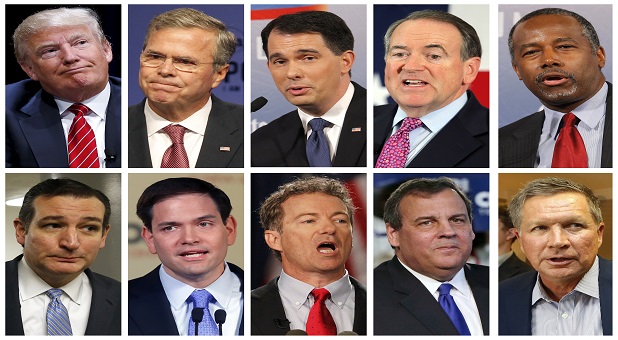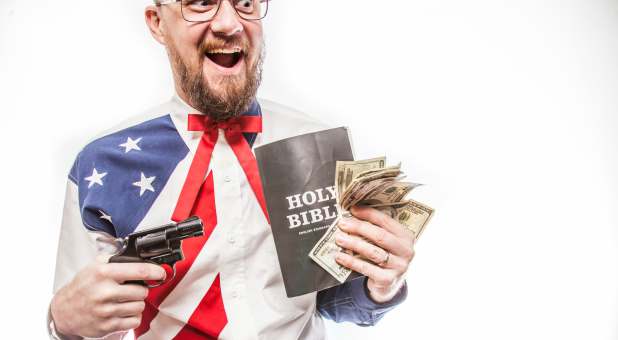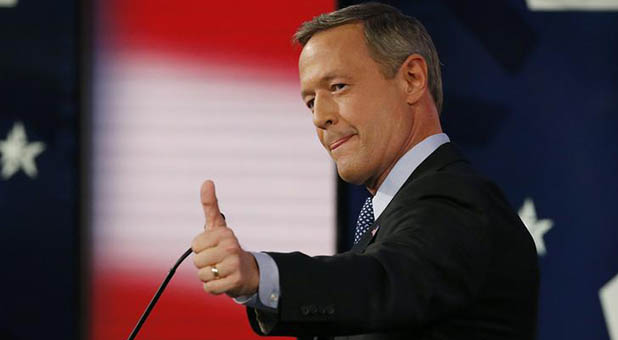When the blinding light shines, the whole world watches, and the decision is about to be made, will the gates be opened to all or just to a chosen few? No, I’m not talking about free will vs. predestination: I’m talking about the first Republican presidential debate on Fox News tomorrow night. The GOP field is nothing if not…abundant, with 17 candidates, virtually all with impressive qualifications. (When the field’s “longshot” is the former governor of Virginia, who chaired an anti-terrorism task force, that says a lot.) Unfortunately, the American people won’t have an opportunity to hear all of them in prime time. Fox News officials said there is no way they can host a meaningful debate with a field that large, so instead they will limit the debate to the candidates who finish in the top 10 in national polls. That’s enough choice for the American people. The rest of the candidates will be part of a consolation prize debate at 5 p.m. – which would be the perfect time for a Democratic debate, because it’s between Jerry Springer and Judge Judy. That means the 10 candidates who made the cut for Fox News’ GOP presidential debate in Cleveland are (in order of poll ranking): Donald Trump; former Florida Gov. Jeb Bush; Wisconsin Gov. Scott Walker; former Arkansas Gov. Mike Huckabee; retired neurosurgeon Ben Carson; Texas Sen. Ted Cruz; Florida Sen. Marco Rubio; Kentucky Sen. Rand Paul; New Jersey Gov. Chris Christie; and Ohio Gov. John Kasich. That leaves out former Texas Gov. Rick Perry, former Sen. Rick Santorum, Louisiana Gov. Bobby Jindal, former Virginia Gov. Jim Gilmore, former Hewlitt Packard CEO Carly Fiorina, Sen. Lindsey Graham of South Carolina, and former New York Gov. George Pataki. Regardless of its protests, Fox News – and CNN, which has announced it will follow similar criteria – should allow every announced GOP presidential candidate to debate openly, in prime time. Excluding candidates based on national polls is a bad idea, because: 1. It excludes excellent candidates. This election cycle the GOP has an embarrassment of riches. Virtually every one of its hopefuls has more experience than Barack Obama had at his first inauguration. The fact that a national audience will not hear from them is a tragedy and more than a little hypocritical. After all, Fox News made room for Rev. Al Sharpton in its 2004 Democratic presidential primary debate. Is it really asking too much for them to include the candidate who won 11 states in the 2012 GOP primaries, the sitting governor of Louisiana, and the former governors of Texas and Virginia? 2. It gives greater legitimacy to often manipulated polls. Leaders don’t make decisions based exclusively on polling data. Polls so routinely skew their results to the Left that they are suspicious or spurious. Do we really need to further their influence on the electorate? 3. It ignores the will of early voting states like Iowa and New Hampshire. Leading a national poll in the primary or general election is nice, but the American political system is actually 50 state races. For the primaries, that begins in Iowa and New Hampshire – where the top 10 list is similar but not identical to the lineup that will be onstage in Ohio tomorrow. FNC host Chris Wallace defended using a national poll, saying the debate ” is a national event, not a local event.” But the importance of those states is precisely that voters in Iowa and New Hampshire have the opportunity to meet candidates one-on-one. The Republican Party Establishment has threatened to strip the early states of their status, allegedly because of a lack of “diversity,” but really because of the next reason that using national polls is a bad idea, namely that – 4. It rewards candidates with the most money or name recognition. Polls at this stage rely on name recognition – whether earned or purchased – not qualifications. In an election where candidates could spend as much as $5 billion to get elected, we don’t need primary debates to accelerate the trend toward candidates who have sold themselves out to the donor class. That trend also benefits the GOP Establishment, because – 5. It prevents unknown candidates from making headway and spares the anointed frontrunner scrutiny. There’s no doubt that an outstanding debate performance can change the entire direction of a presidential race. Ask Richard Nixon. But even in the primaries, this trend has played out time after time. In 2007, when most of the media had written him off, John McCain set himself on the road to becoming the nominee after a one-liner in a primary debate. Mike Huckabee shot right past Mitt Romney to become McCain’s conservative challenger after a well-timed turn of phrase about “John Edwards in a beauty shop” during a debate. Even Jim Gilmore and Gary Johnson made splashes in the debates that allowed them to participate in the 2008 and 2012 primaries. Lesser-known candidates are also more likely to snipe at those doing well in the polls, in order to topple them and take their place. Without this vetting, Republicans could nominate a weak candidate who has not had to fend off an aggressive debate foe. (To be fair, no one could have been prepared for Joe Biden last time out.) Will the lack of debates constrict our choices to a few favored candidates, keep a dark horse conservative from emerging, or allow a weak frontrunner to go untested? Maybe that’s the point. 6. It makes embittered candidates consider running third party. In 2012, libertarian-leaning Republicans lambasted the debate hosts for adopting “arbitrary” criteria that allowed liberal (and not-very-popular) Utah Governor Jon Huntsman to take part but excluded former two-term New Mexico Governor Gary Johnson. Some of the polling organizations didn’t even include Johnson in the polls, trapping him in an impossible situation. “It appears as though they all get together and invoke the ‘Gary Johnson Rule,’ which is: How do we exclude Gary Johnson from the debate?” the governor (who is no relation) told me in 2011. Johnson later said being excluded from the debates convinced him to run as the 2012 Libertarian Party presidential candidate. “If I’d have been included in 16 of the last debates we wouldn’t even be having this conversation,” Gov. Johnson said as he announced his candidacy. Fox News and GOP kingmakers should be careful that, in their urge to pre-select the Republican presidential candidate, they not risk the wrath of candidates – and voters, who like to make up their own mind. Why not instead adopt Rick Santorum’s proposal? Fox, or CNN, could host two debates – in prime time, on successive nights – each featuring a mix of candidates according to ranking. The first debate could feature those who rank in odd numbers (candidates number 1, 3, 5, 7) and the second featuring the even numbers? You report, we’ll decide.
See an error in this article?
To contact us or to submit an article





















